When Technology Empowers Life, How Does Our District Undertake "Smart Responsibility"? September 05,2024
This year marks the fifth anniversary of the proposal of the People's City concept. As the place where it was first proposed, Yangpu, with its booming digital economy development and vibrant life, let's feel this increasingly "YOUNG" people's city...
On a summer weekend, beside the tree-lined path in Huangxing Park, accompanied by the chirping of cicadas, a young man named Xiao Zhu has just finished his morning run. He picks up his breakfast "air-delivered" by a drone and enjoys a quick and delicious meal...
This is one of the epitomes of our district's transformation from "Yangshupu" to "Digital Yangpu." The government sets the stage, and digital economy enterprises take the stage. Technology blossoms, transforms rapidly, and "lays eggs along the way," turning into "gold" on the road of exploring intelligent social governance. When big data gives wings of wisdom to the various aspects of the district, how will residents' lives "soar high"?
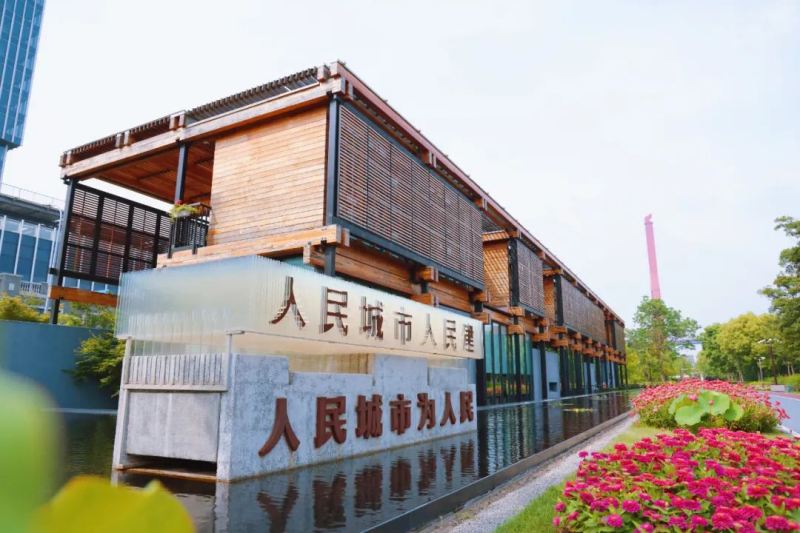
Digital Empowerment of Life—Smart "Online," Flying into the Homes of Ordinary People
"This is our responsibility to elderly people living alone."
Since last summer, an elderly resident named Xia Lindi, who lives in Changbai Xincun Sub-district, has added a new member to her home—a smart water meter. After signing a monitoring consent form, if the water consumption in the elderly person's home is lower than 0.01 cubic meters or higher than 2 cubic meters within 24 hours, the backend AI system will automatically issue an early warning, immediately contact family members by phone, and send a warning message to the mobile phones of neighborhood committee members or community care workers.
Since the smart water meter detection system was installed, I feel much more at ease. If I'm too busy to handle it, the AI system will call to notify me. Dai Mingfang, the community care worker responsible for caring for Xia Lindi, used to visit more than 40 elderly people living alone every day, but now her workload has been greatly reduced.
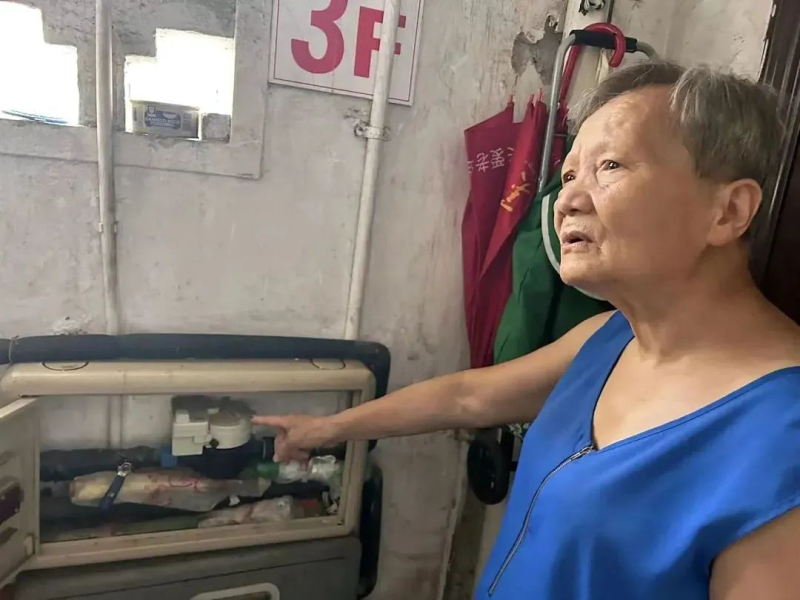
After the pilot project of smart water meters in Changbai Xincun Sub-district, it is now being promoted throughout the district. Data shows that in 2023, our district has completed the smart water meter safety monitoring service for 128 elderly people living alone or with special difficulties. This year, this service was included in the list of practical matters of the municipal government for the first time. Our district plans to provide smart water meter safety monitoring services for another 1,000 elderly people living alone or with special difficulties, bringing a strong sense of safety to the elderly group through technological assistance.
For the elderly, digital empowerment means "protection." The development of smart elderly care continues to advance. In Yinhang Street, which currently has 67,200 elderly people, its innovative "digital elderly care" services include eight application scenarios such as intelligent voice companions, hygiene room call, smoke alarm, gas alarm, and sleep monitoring. As of January this year, it has received and promptly handled 286 smoke alarms, 16 gas alarms, and thousands of emergency calls.
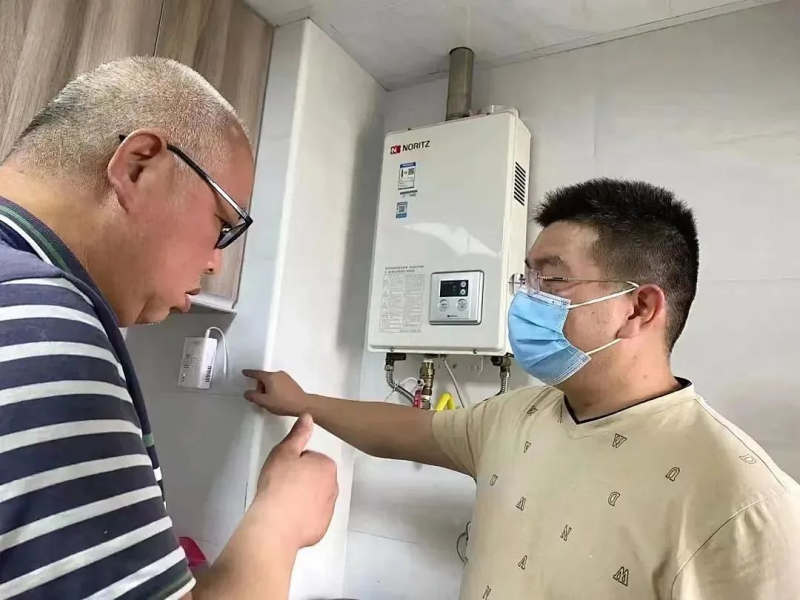
In our district's smart nursing homes, the "one-screen" construction adds convenience for elderly residents, provides peace of mind for family members, and reduces the burden on staff. In each comprehensive elderly service center, networked exercise and fitness equipment monitors the physical fitness of the elderly, helping to improve their health. The "Elderly Care e-Consultant" has settled in the "Yangpu District Flagship Store" of "Suishenban," providing one-stop display of regional service consultation information...
For a broader age group, the charm of "Digital Yangpu" lies in its efficiency. Our district is using digitalization to open up the "acceleration" of people's livelihood and happiness, creating a high-quality life.
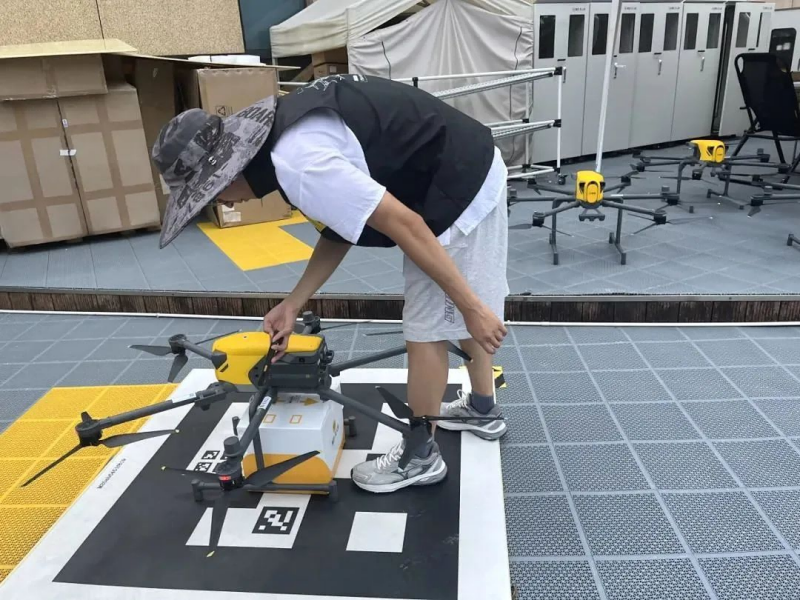
For example, in July this year, Meituan's drones started trial operation of the second route in our district, realizing convenient delivery services from Wujiaochang directly to Huangxing Park. The online virtual comprehensive window has been launched, allowing enterprises to have "exclusive customer service" for cross-provincial matters, and they can conduct "remote guidance" through "hand-to-hand" and "screen-to-screen" interactions. In our district, the application scenarios of the digital economy cover almost every aspect of work and life, and it seems that every little thing has entered a "worry-free mode."
Putting technology into use has always been the greatest support for innovation. The development of the digital economy in our district is constantly transforming from a "high-end" innovation industry landscape into a living reality that the people can "see and touch."
Digital Empowerment of Assistance—"High-Tech" Reaching the Most "Grassroots"
To build "Digital Yangpu" into a "cloud city," digital "tentacles" must be extended to the most grassroots groups. In July 2023, the "Warm Cloud" system was officially launched in our district, making the new model of proactive assistance where "policies find people" a reality.
Warm Cloud is a precise assistance service platform under the warm series of people's livelihood guarantee service brand launched by the District Civil Affairs Bureau. It is now piloting in Wujiaochang Sub-district. The project combines multiple application scenarios such as assistance policy consultation, identification of people in difficulty, and emergency assistance support. It has three core systems: label system, indicator system, and resource system. In short, it uses the information of more than 120,000 registered population as the "base" of big data, classifies groups such as severely disabled unemployed, preferential treatment targets, and party members into different categories using more than 120 identity labels, and actively solves difficulties for the assisted targets by coordinating resources such as policies and manpower.
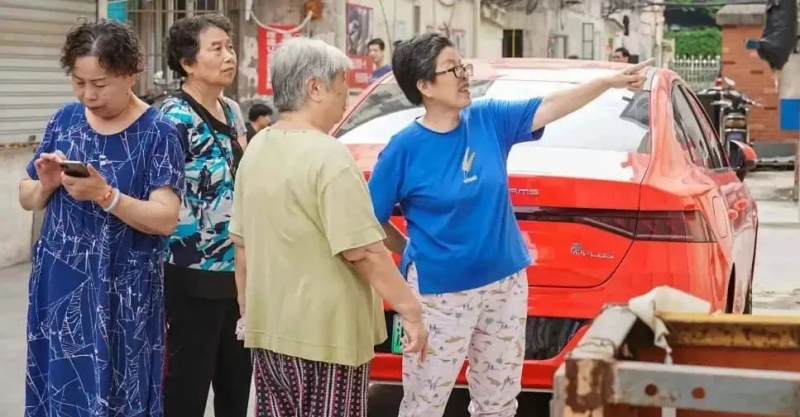
Xiao Jiang, a 14-year-old, will enter a vocational school to study in September this year. His mother has undergone chemotherapy for breast cancer and is currently unemployed with a non-local household registration. His father is the only one working to support the family of three. In April this year, through the screening of the Warm Cloud system, Wujiaochang Sub-district discovered that Xiao Jiang's father also suffered from appendiceal cancer and was undergoing postoperative chemotherapy. With both parents suffering from serious illnesses, Xiao Jiang met the relevant application standards for children in distress.
Since then, the staff of the sub-district's unsecured station have started visiting and comforting the family, introducing medical expense reimbursement, children in distress, and other policies to Xiao Jiang's parents, and helping them process the required materials and relevant procedures. The sub-district also helped them connect with resources such as comprehensive support, pairing with two thousand families, living supplies, housing security policies, and family education guidance, providing a solid guarantee for family harmony and the growth of minors. Currently, Xiao Jiang's family has been receiving economic assistance for children in distress since May this year.
Xiao Jiang is not an isolated case. As of June this year, the Warm Cloud system has covered the basic information of 141,000 residents, 131 labels in 5 categories, formed a base of 36,400 care targets, found the 25 most difficult families, and included 62 caring enterprise resources, continuously increasing the "warmth index" of our district.
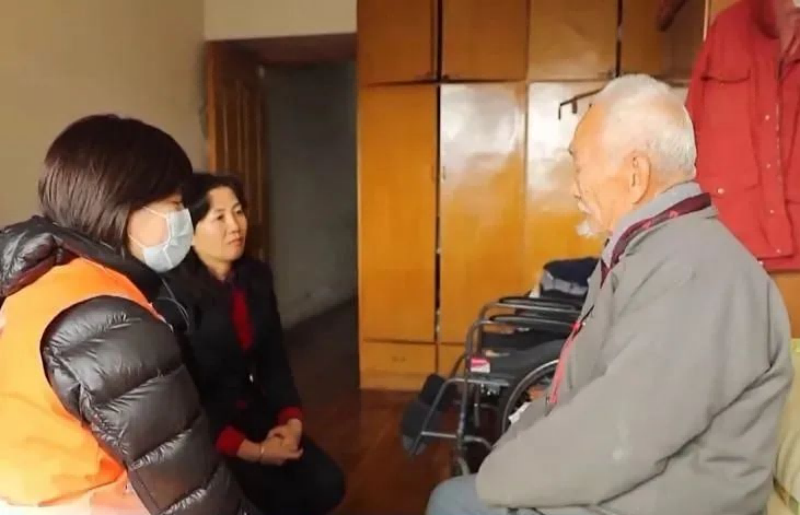
While the "Warm Cloud" provides policy assistance to residents, the launch of another "cloud platform" brings immediate help. In our district, many elderly people living alone have a "magical" telephone at home with three additional buttons: one for "help," and the other two for separately set family numbers. This is one of the people's livelihood practical matters of the Yangpu Civil Affairs Department—the "One-Click Connection."
The "help" button is directly connected to the "One-Click Connection" service platform. Once an elderly person encounters an emergency at home and needs help, they can pick up the handset, press the button, make a request, and the call center staff will immediately judge the situation based on the content of the call, the state of the elderly person, and their expression ability, and help provide 24-hour emergency services such as alarm and information consultation. The telephone also has a matching remote control for the elderly to wear on their body for convenient help at any time.
"With this phone, I feel much more at ease, like having an extra guarantee," said Granny Zhu, an elderly person living alone in Daqiao Sub-district, happily and directly.
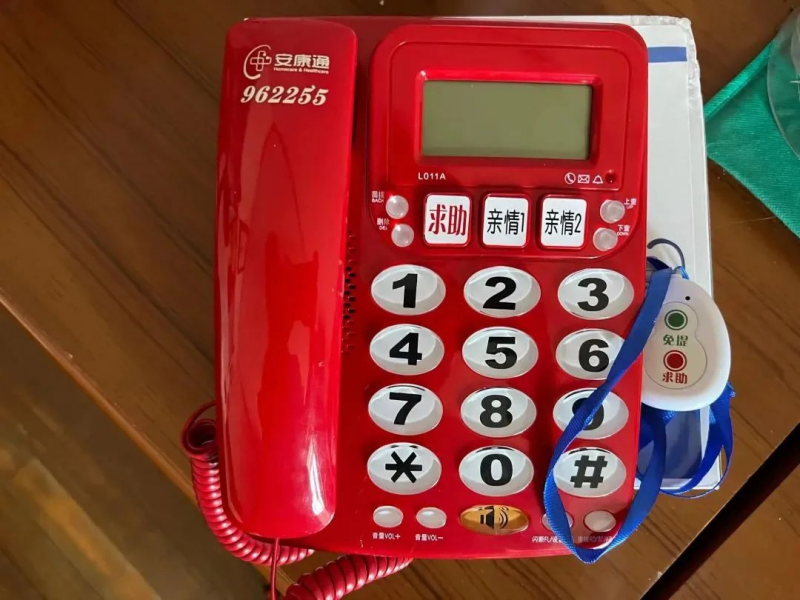
In the past year, the "One-Click Connection" service has served 104,200 person-times in our district. In 2024, the service also plans to further expand its coverage to 10,000 elderly people.
There are always some groups in society who need social help but have long been "silent" for various reasons, becoming the "silent minority." Big data may seem "emotionless" but is actually "compassionate." Through hierarchical classification and precise positioning, government departments can provide efficient services to different targets and weave a scientifically intelligent protective net for countless elderly people, disadvantaged groups, and others.
Digital Empowerment of Governance—Grasping the Overall Management, Knowing "Everything Under the Sun" on One Screen
As Shanghai's only national intelligent social governance experimental comprehensive base, our district has joined hands with Tongji University to always strengthen multi-party participation, accelerate scenario construction, actively explore the policy system, standard norms, and system mechanism of intelligent social governance, and accelerate the implementation and fruition of new technologies, new models, and new scenarios of intelligent governance.
The digital economy empowers digital "governance" and demonstrates digital "intelligence." How can digital governance minimize the burden on the grassroots and improve the effectiveness of urban governance? Digital urban management may be an answer.
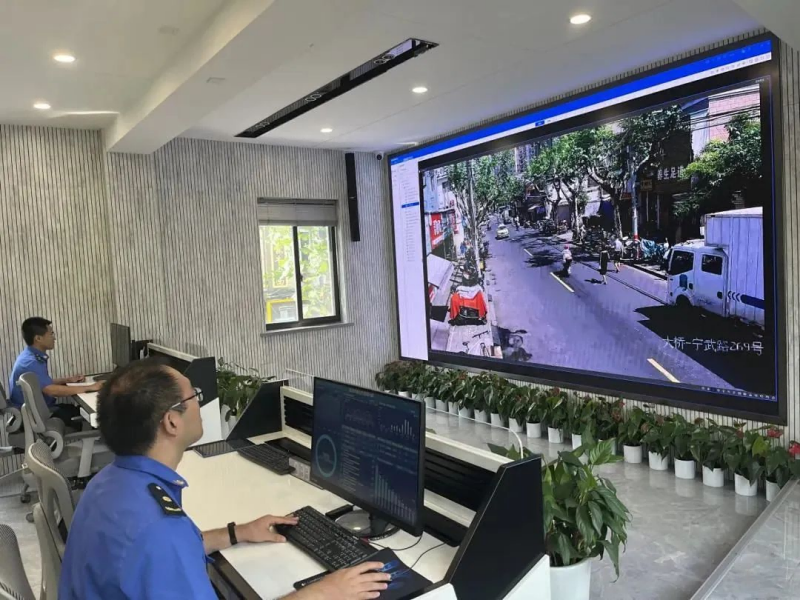
A fruit supermarket temporarily placed a few baskets of unsold fruits on the sidewalk to make room for new goods. On the big screen of the Yangpu Urban Management Command Center, a piece of information was automatically pushed, prompting staff that there was a cross-door stacking of fresh fragrance, and automatically capturing photos as evidence. At the same time, the system also automatically pushed a piece of information to the owner of the fruit supermarket, requiring them to rectify it themselves. So, the owner immediately moved the fruits back into the store. At this point, the handling of this illegal cross-door stacking was completed, with the entire process taking less than half an hour.
This is the power of digital urban management. Previously, the urban management department had set up control balls, or "thousand-mile eyes," at numerous key points in the 12 sub-districts of the district to achieve precise and remote management of relevant areas. In this way, on the basis of breaking departmental barriers, the data of the entire district further achieves collaborative support, enabling the urban management department to improve precision and illegal governance satisfaction when managing issues such as cross-door business and cross-door stacking of street-front shops with a joint command model of "intelligence + network."
This year, the number of control balls for digital urban management in the entire district has increased to 70, and digital urban management also plans to launch version 2.0. In July this year, the District Urban Operation Center also took the lead in gathering relevant representatives from 12 sub-districts to organize and carry out "one-network integrated management" business training, introducing and guiding Yangpu's intelligent management, and extensively soliciting opinions and requirements from sub-districts. In the future, the digital urban management platform will be built into an "all-in-one" platform that is convenient for sub-districts to participate in and jointly manage the streets of the district.
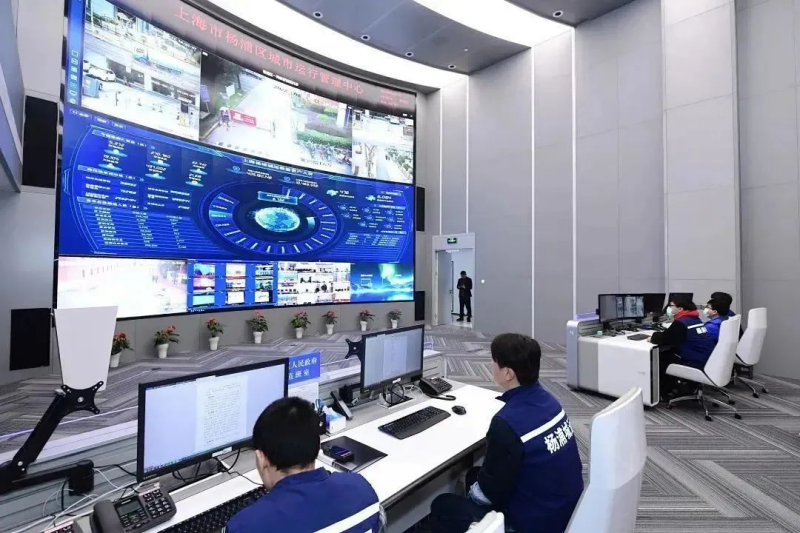
Using digital "governance" to break through the management difficulties of government departments is not "rare" in our district. In Siping Road Sub-district, community workers who used to walk the streets with a small notebook and pen now only need to carry a mobile phone. The digital platform for grassroots governance, that is, the new version of the community cloud, stores a large amount of information about people and houses in the background, which can be retrieved, integrated, updated, and supplemented at any time, allowing frontline workers to improve work efficiency. In Yinhang Street, the intelligent bicycle shed innovation has been implemented, solving the parking and charging problems of 30,000 non-motorized vehicles in the district with an intelligent model of "four-in-one" intelligent access control, intelligent fire protection, intelligent charging, and intelligent probes.
With an area of 2.15 square kilometers and a resident population of nearly 100,000, old communities account for more than two-thirds of all communities, and the basic parking space allocation is 0.1 per household. Kongjiang Road Sub-district, with a high concentration of old communities, has long been plagued by the difficulty of "parking."
In recent years, the sub-district has introduced a professional team from Tongji University to plan the setting of parking spaces and traffic flow in the communities in combination with projects such as "micro-renovation," and built the Kongjiang Road Sub-district Intelligent Parking Governance Platform. For the communities in the district, the sub-district has set up micro-checkpoint sensors, monitoring probes, and other hardware devices to collect information on vehicles entering and leaving the communities. Combined with the parking space data of the communities, it uploads the real-time situation of parking spaces in all 59 communities in the district. It has installed geomagnetic devices to grasp the real-time parking space situation of 240 roadside parking spaces on 9 roads in the district and has accessed the real-time data of parking spaces in 13 commercial parking lots and 3 parks in and around the district.
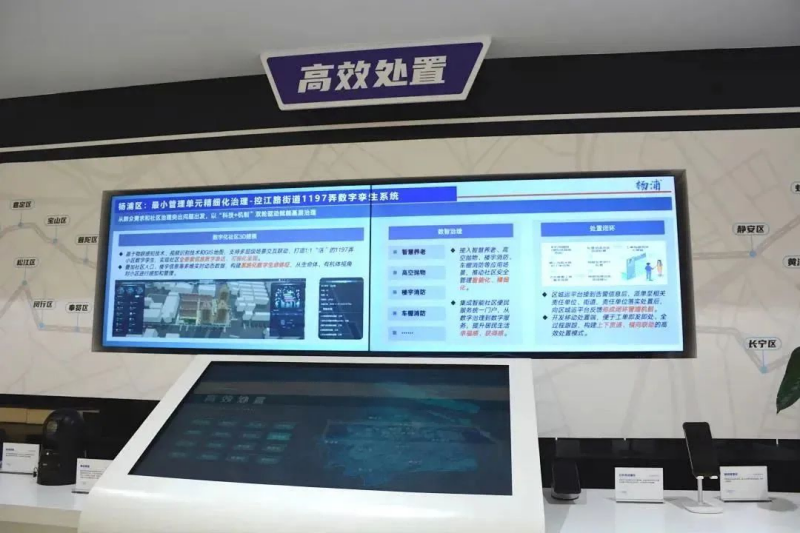
Now, in the Kongjiang Road Sub-district Urban Operation Management Center, a data big screen updates parking space data in real-time, making the information of 14,245 parking spaces in the district clear at a glance.
When residents need to park, they can directly enter the "Kongjiang Multi-Generation House" WeChat Official Account, click "Enter Kongjiang," select "Intelligent Parking," and enter the "Community Parking Governance Platform" Mini Program. Based on real-time positioning, residents can see the idle parking spaces around them, the situation of remaining parking spaces, the distance of parking spaces, charging standards, and other functions on one screen. Residents can also navigate to the parking space with one click.
"Red means the parking spaces are full, orange means the parking spaces are tight, and green means the parking spaces are sufficient. We can see these clearly at a glance. In the past, when I came home late from work, I would worry about parking before getting home. Now I don't have this trouble anymore!" said Mr. Liu, a resident, happily.
As the new round of technological revolution and industrial transformation deepens, the value of data as a key production factor is becoming increasingly prominent. The digital economy has become an important driving force for our district to promote economic growth, providing strong support for high-quality development in the region.
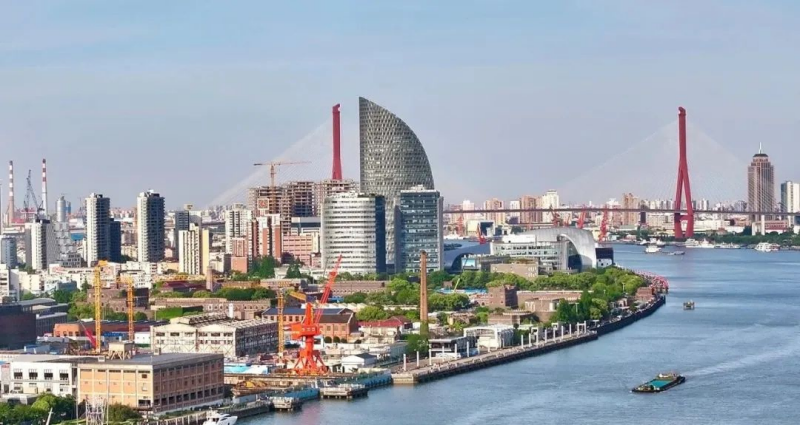
Today, strolling along the Yangpu Riverside, the river breeze remains the same, but new ideas are emerging one after another. Bilibili, with about 90% of its users being post-90s, is building its global headquarters here; the instant retail and delivery platform Dada makes shopping "arrive in 1 hour." Looking to the future, our district will continue to "ride the numbers and rise," make every effort to connect data veins, promote grassroots digital governance, and empower development through digital transformation.